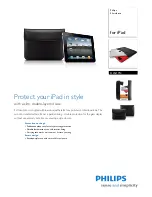
45
•
IMAP accounts
–
Username
: Depending on the requirements of your email service
provider, your full email address or just your username (that is, the part
before @emailprovider.com in your email address).
–
Password
: The password for your email account, which should carry
forward from the previous screen.
–
IMAP server
: The fully resolved domain name of your email service
provider’s IMAP server, for example, imap.emailprovider.com.
–
Security type
: Select the security type required by your email service
provider. Select the
SSL (Accept all certificates)
option for your security
type to accept a server certificate from your IMAP server that is self-
signed, out of date, or in some other way not accepted by the Email
application.
–
Port
: Set the Security type first to enter the typical server port number
in this field automatically. Or enter a different port number if your email
service provider requires it.
–
IMAP path prefix
: Leave blank unless instructed to enter a specific
prefix by your email service provider.
•
Exchange ActiveSync accounts
–
Domain\Username
: If your Exchange ActiveSync server requires that
you specify a domain, enter it before the backslash. Otherwise, just
enter your username (the part before @emailprovider.com in your email
address) after the backslash. The backslash is optional when only
entering your username. The Email app enters the correct syntax for
domains and usernames when communicating with the server.
–
Password
: The password for your email account, which should carry
forward from the previous screen.
–
Server
: The fully resolved hostname of the Exchange ActiveSync server,
for example, mail.emailprovider.com.
–
Use secure connection (SSL)
: Check this option if your Exchange
ActiveSync server requires you to connect to the server securely, or if
you prefer to connect securely.
–
Accept all SSL certificates
: Check this option if you want to accept a
server certificate from your Exchange ActiveSync server that is self-
signed, out of date, or in some other way not accepted by the Email
application.
Outgoing Server Settings
If you use an IMAP or POP3 account for receiving email, you
typically use an SMTP server to send email from that account.
Exchange ActiveSync accounts do not have separate outgoing
server settings.
•
SMTP server
: The fully resolved domain name of your email service
provider’s SMTP server, for example, smtp.emprovider.com.
•
Security type
: Select the security type required by your email service
provider. Select the
SLL (Accept all certificates)
option for your
security type to accept a server certificate from your SMTP server that
is self-signed, out of date, or in some other way not accepted by the
Email application.
















































